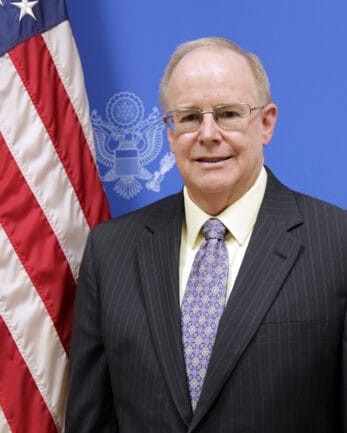RICHARD SULTAN
The United States is linking more financial aid to South Sudan the increased transparency in oil money spending, a senior American official has said.
Transparency in oil revenue is part of a package of reforms that the International Monetary Fund is demanding before further support to the country. The Fund declined to fund the country when officials visited DC recently right after the Finance minister told the media that the government had sold off the oil up to 2027, leaving it incapable of paying teachers.
“Of interest to the international community, and particularly to the US, is how the revenue from the oil is managed,” Charge d’affaires David Renz said this June 2 in chats with journalists as he departed for the US at the end of his tour of duty.
The government, Renz added, should embrace the International Monetary Fund reforms, if money is to continue to flow in to support the development of the country. Renz said that the US wants to treat South Sudan as a partner that can contribute to its own development activities, instead of focusing on the humanitarian side of things.
“As things stand, that is not possible because the government can’t meet its development goals and humanitarian needs,” Renz said. “That is why the US is giving millions of dollars annually for humanitarian support.”
ENOUGH GUNS TO INTEGRATE REBELS
The official said that the US supports the renewed UN arms embargo on South Sudan to force the parties to stick to the peace. South Sudan excuse for not integrating rebel forces into the national army is that it lacks firearms for the fighters because of the arms embargo
“The arms embargo has reduced the ability of the warring parties to launch attacks and (forced them to) stick to the agreement, though at a slow pace,” Renz said. “There are actually enough guns in this country to graduate the unified forces. What is lacking is only political will”.
The parties agreed on the military command structures in April, but the former rebel fighters have been left out to pasture after the training, with government saying that it didn’t have the arms to give them. As Renz spoke, the UN was calling for faster implementation of milestones of the peace agreement.
“Time is of the essence in view of the looming end of the transitional period,” Nicholas Haysom, the Special Representative of the Secretary-General said at the JMEC meeting June 2. “To underline our main concerns, the government and the parties must work with a sense of urgency to: Pass the constitutional making process bill, graduate the first batch of the NUF and progress the 3 April agreement, (and) Work with NCAC to expediate the National Elections Bill process.”




